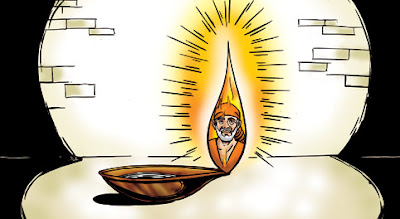
Sai Baba has provided us with many hints to write on this topic, emphasizing the importance of understanding Karma as His devoted followers. It is a science that holds significance for us in terms of self-realization. Our Sai Baba took an avatar in Shirdi to guide us toward comprehending the ultimate purpose of our human birth. His purpose was not only to alleviate our sufferings but to eradicate their root causes as well. Sai Baba’s compassion is boundless, as He willingly took upon Himself the sufferings of humanity to demonstrate His profound love for us. His goal is to show us the path to liberation, making it imperative for all of us to grasp the concept of Karma. This vast subject can be best understood when shared in smaller portions. In this initial segment, we will delve into the importance of understanding Karma.
Understanding Karma through Shri Sai Satcharitra
We have read the Shri Sai Satcharitra many times, and the first chapter may seem like just an introduction. However, Baba actually shares a very important message in this chapter that is repeated throughout the book. He teaches us about self-realization through our actions, which means understanding ourselves deeply. Baba showed this through an incident where he ground wheat to fight a cholera epidemic. It may seem like a simple act, but it carries a deeper meaning. Baba wanted to convey that we should always remember the importance of self-realization, just like the peg in a grinding stone. By turning inward and focusing on our inner growth, we can avoid being overwhelmed by the effects of Karma. In the upcoming series on “Karma,” we will delve into the profound significance of the incident where Baba grinds wheat, decoding its hidden message.
So far we explained the concept of Karma, which in general, is highly misinterpreted as instant reaction/regret and a kind of cause/effect theory. But now we know Karma is nothing but a huge repository of all the data we gathered through our senses from the day we were born. And our current and future actions are highly influenced by this repository. Rather than delving into the complexities of categorizing karma as good or bad, it is more beneficial to focus on the technical aspects, transcending judgment. Let us explore some quotes that will aid us in gaining a better understanding of Karma.
We would like to refer to slokas from Patanjali’s yoga sutra and from Sri Krishna’s Bhagavad Gita, which will throw some light on this.
Understanding Karma through Patanjali’s Yoga Sutra

क्लेशमूलः कर्माशयो दृष्टादृष्टजन्मवेदनीयः ॥ २.१२ ॥
— Patanjali Yoga Sutra Chapter 2, Sutra – 12
Transliteration: Klesamulah-Karmasayah-Drsta-Adrsta-Janma-Vedaniyah
Translation word by word: Klesamulah: having Klesa (affliction) as its origin, root – Karmasayah: a repository of Karma – Drsta: seen or in our understanding – Adrsta: unseen or not in our understanding – Janma: in births; Vedaniyah: to be experienced
Interpretation: The repository of actions has its root in these obstructive experiences that cause pain and pleasure, and whether we comprehend it or not in this lifetime, it remains a part of our experience.
Our Interpretation
In the above sloka, Patanjali Muni refers to the repository of all data which we collect through the actions we perform through our senses and organs, which is the root cause of all the effects, that may be pain or pleasure (outcome of our actions in our life) which we experience in our lifetime, sometimes such experience may be understandable through our logics or it may not be so.
Also, let us see the Karma from Sri Krishna’s point of view, from His Bhagavad Gita

Download Shirdi Sai Baba Mantra Book for Free
As we celebrate this day, we invite you to download our ‘Shirdi Sai Baba Mantra’ book, which is a collection of powerful mantras that can help you connect with the divine energy of Sai Baba and seek His blessings. We hope this book serves as a valuable resource on your spiritual journey and brings you closer to the love and grace of Sai Baba.
Understanding Karma through Bhagavad Gita

कर्मेन्द्रियाणि संयम्य य आस्ते मनसा स्मरन्।
— Bhagavad Gita: Chapter 3, Verse 6
इन्द्रियान्विमूढात्मा मिथ्याचारः स उच्यते ॥6॥
Transliteration: karmendriyāṇi sanyamya ya āste manasā smaran. indriyārthān vimūḍhātmā mithyāchāraḥ sa uchyate
Translation word by word: karma-indriyāṇi—organs of action; sanyamya—restrain; yaḥ—who; āste—remain; manasā—in the mind; smaran—to remember; indriya-arthān—sense objects; vimūḍha-ātmā—the deluded; mithyā-āchāraḥ — wongdoer; saḥ—they; uchyate—are called
Interpretation: Those who restrain their physical actions while persistently dwelling on sensory objects in their minds, unquestionably deceive themselves and can be called wrongdoers.

यस्त्विन्द्रियाणि मनसा नियम्यारभतेऽर्जुन।
— Bhagavad Gita: Chapter 3, Verse 7
कर्मेन्द्रियैः कर्मयोगमसक्तः स विशिष्यते ॥ 7॥
Transliteration: yas tvindriyāṇi manasā niyamyārabhate Arjuna, karmendriyaiḥ karma-yogam asaktaḥ sa viśhiṣhyate
Translation word by word: yaḥ—who; tu—but; indriyāṇi—the senses; manasā—by the mind; niyamya—control; ārabhate—begins; arjuna—Arjun; karma-indriyaiḥ—by the working senses; karma-yogam—karm yog; asaktaḥ—without attachment; saḥ—they; viśhiṣhyate—are superior
Interpretation: But, whosoever controls the senses by the mind, O Arjuna, engages their organs of action in Karma Yoga, without attachment, they are the special ones.
Our Interpretation
In Chapter 3, Karma Yog, verse 6, Sri Krishna says, those who refrain from physical actions but dwell in their senses are wrongdoers, which means, still, they accumulate Karma which is more data added to their repository, and the outcome will never lead them to moksha.
In the same chapter, Verse 7, Sri Krishna says, those who have absolute control over their sense and still perform physical activities, which is Karma yoga, and those who do so are the special ones, which means they are on the right path towards Moksha.
Both the slokas clearly explain the senses are the doorway to the repository of Karma, good or bad whatever the nature of action is, it will be the hurdle towards the path of moksha. So karma doesn’t mean only bad, it is both good and bad, but it stands as a hurdle for one to walk on the path towards moksha.
Let us explore more on this journey of understanding Karma and let us attain the self-realization, the moksha that our Sai Baba wanted everyone to attain. Jai Gurudev!
Final Words
Though it may be spiritually challenging to comprehend, these quotes shed light on the nature of Karma. From these quotes, it becomes evident that karma acts as a significant obstacle to self-realization, yet it is also through karma that we can achieve self-realization. Our very existence is a product of our accumulated karma (we will discuss various types of karma in our subsequent posts). The fact that we possess a human body and are born as individuals signifies that we carry a repository of karma. This human form serves as a vessel to attain liberation. Karma itself acts as the mechanism for removing accumulated karma, enabling us to transcend from Jeevatma (individual soul) to Parmatma (Supreme Soul). Karma that leads us towards self-realization is known as Shuddha Karma, while karma that deviates us from the path is known as Ashuddha Karma.
Image Courtesy: Sai Baba Images With Quotes on Karma
Further in this series
More to Explore
© Shirdi Sai Baba Life Teachings and Stories – Member of SaiYugNetwork.com



